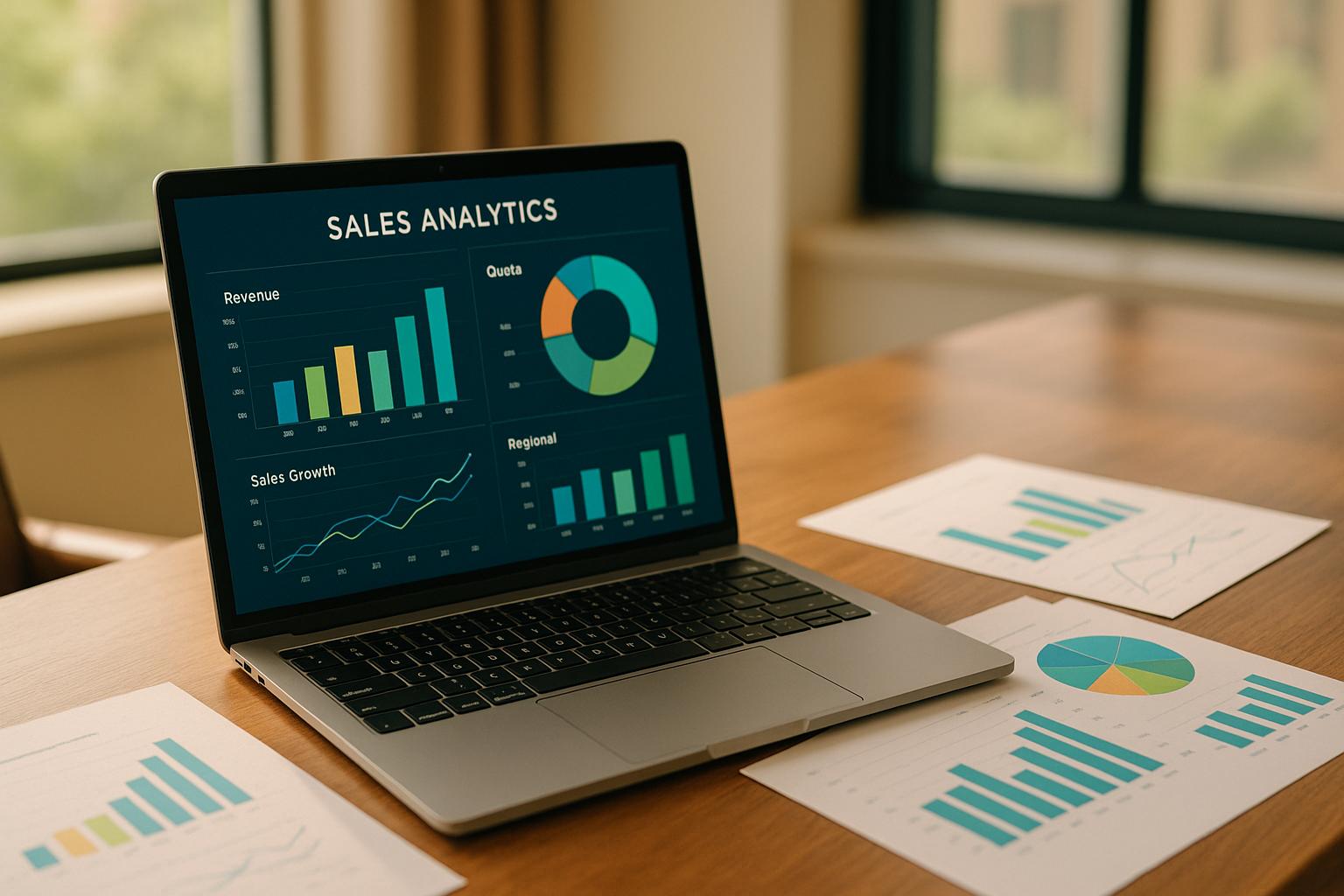AI lead scoring can transform your sales process by improving lead quality, boosting conversion rates, and shortening sales cycles.
Here’s what you need to know:
- Traditional lead scoring systems are only 30% accurate, often wasting time on low-quality leads.
- AI-powered lead scoring increases accuracy to 90%, leading to better prioritization and results.
- Businesses using AI report:
- 25% higher conversion rates
- 30% shorter sales cycles
- 28% improved sales productivity
Key Case Study Highlights:
- Grammarly: 30% higher MQL conversions, 80% more upgrades, and sales cycles cut in half.
- Harley-Davidson NYC: 2,930% surge in qualified leads, tripling business growth.
- Druva: Boosted conversions and operational efficiency with better lead prioritization.
- U.S. Bank: 260% increase in lead conversions and 300% growth in MQLs.
Quick Comparison
| Company | Industry | Conversion Rate Impact | Lead Quality/Volume Growth | Sales Cycle Impact |
|---|---|---|---|---|
| Grammarly | SaaS/Writing Tools | 30% increase | 50% reduction in lead volume, higher quality | 50% reduction (60-90 to 30 days) |
| Harley-Davidson | Automotive/Motorcycles | Data not detailed | 2,930% rise in qualified leads | Data not detailed |
| Druva | Enterprise Software | Noticeable boost | Enhanced lead management efficiency | Accelerated process |
| U.S. Bank | Financial Services | 260% increase | 300% growth in MQLs | Data not detailed |
AI lead scoring helps businesses prioritize high-value prospects, save time, and drive better results. With tools like Salesforce Einstein or Albert, companies are achieving faster, smarter, and more precise lead management.
Case Study 1: Grammarly – Boosting Conversions with AI
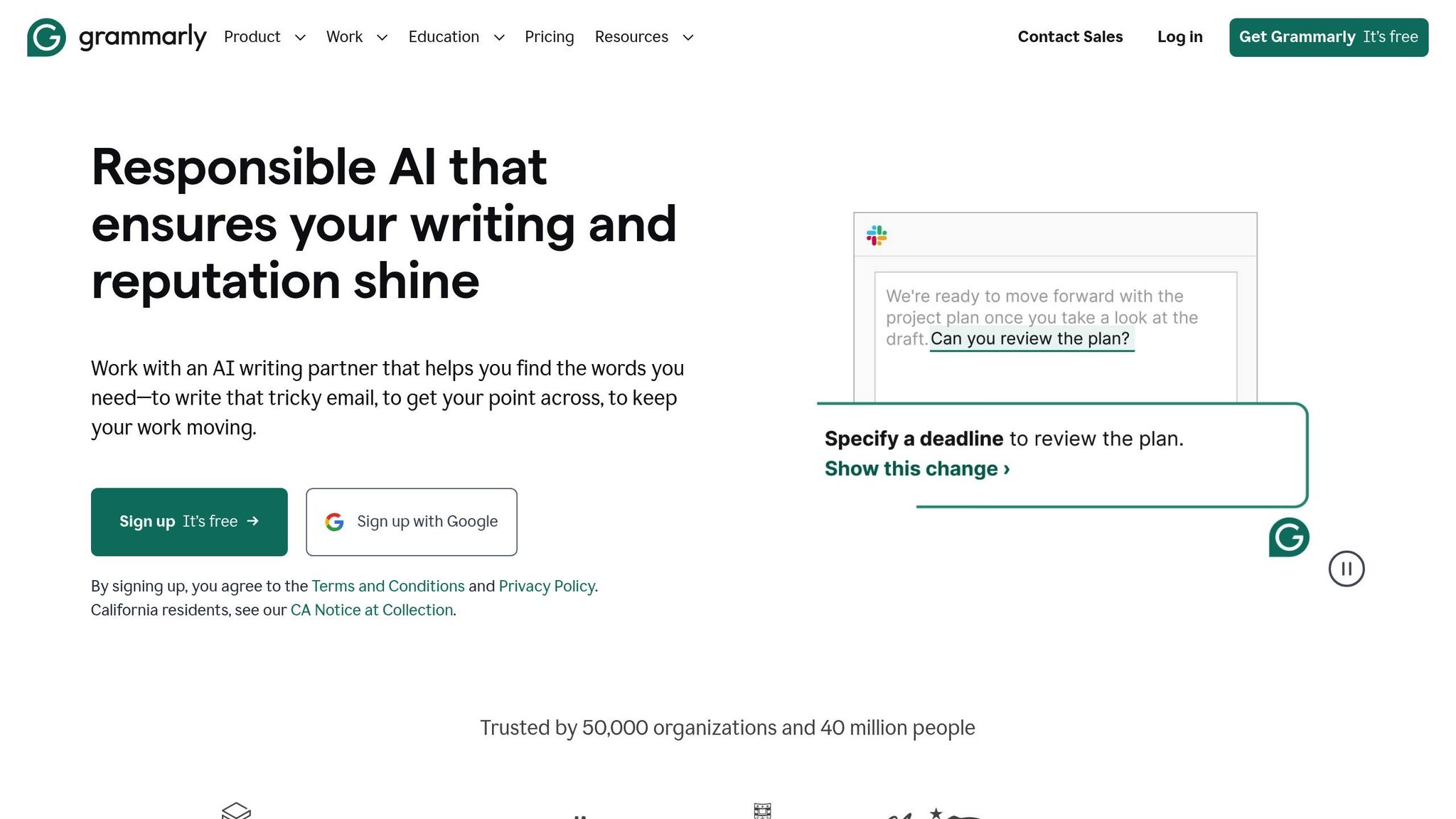
The Challenge
Grammarly faced a major hurdle with its manual processes. Each month, the team handled 400 MQLs (Marketing Qualified Leads), but a significant portion turned out to be spam or unqualified accounts [2]. Sales teams were stuck spending 88% of their workweek on tasks like manual outreach and analyzing leads [1]. To make matters worse, their email lists were built primarily on open rates, which often attracted leads that rarely converted [2]. These inefficiencies highlighted the need for a smarter, automated approach.
The Solution
To address these challenges, Grammarly turned to Salesforce Account Engagement powered by Einstein 1 Marketing. This AI-driven system revolutionized their lead scoring process [2]. Instead of relying on manual methods, the AI evaluated leads based on their engagement levels and business relevance. Qualified leads were automatically routed to the right salesperson, and Slack notifications kept sales and marketing teams aligned [2].
Additionally, Tableau dashboards provided deeper insights, such as identifying users from the same company or recent website visitors, enabling more strategic and targeted outreach [2].
"When I was first introduced to Salesforce, it just made sense. It was intuitive. We don't have to be tied to coding or the complexity that other CRMs can bring."
– Kelli Meador, Senior Marketing Operations Manager, Grammarly [2]
This shift from prioritizing lead quantity to focusing on lead quality allowed the sales team to concentrate on prospects with the highest potential to convert.
The Results
Grammarly saw impressive results after implementing the AI solution. Lead scoring powered by AI increased MQL conversion rates by 30%, while upgrades jumped by 80%. The sales cycle, which previously stretched 60–90 days, was slashed in half to just 30 days [2]. The marketing team also saw a major improvement in efficiency, sending out 200 high-quality leads each month instead of 400 low-value ones [2].
Email performance metrics reflected this transformation as well. The unsubscribe rate dropped to a mere 0.04%, far below the 2% industry standard, and email deliverability improved by 50% [2].
"We've increased our conversion rates between marketing and sales leads, and it's really built trust between the two teams."
– Kelli Meador, Senior Marketing Operations Manager, Grammarly [2]
This case highlights how AI can elevate lead quality, shorten sales cycles, and foster stronger collaboration between marketing and sales teams, setting the stage for long-term success.
Case Study 2: Harley-Davidson – Fast Growth in Qualified Leads
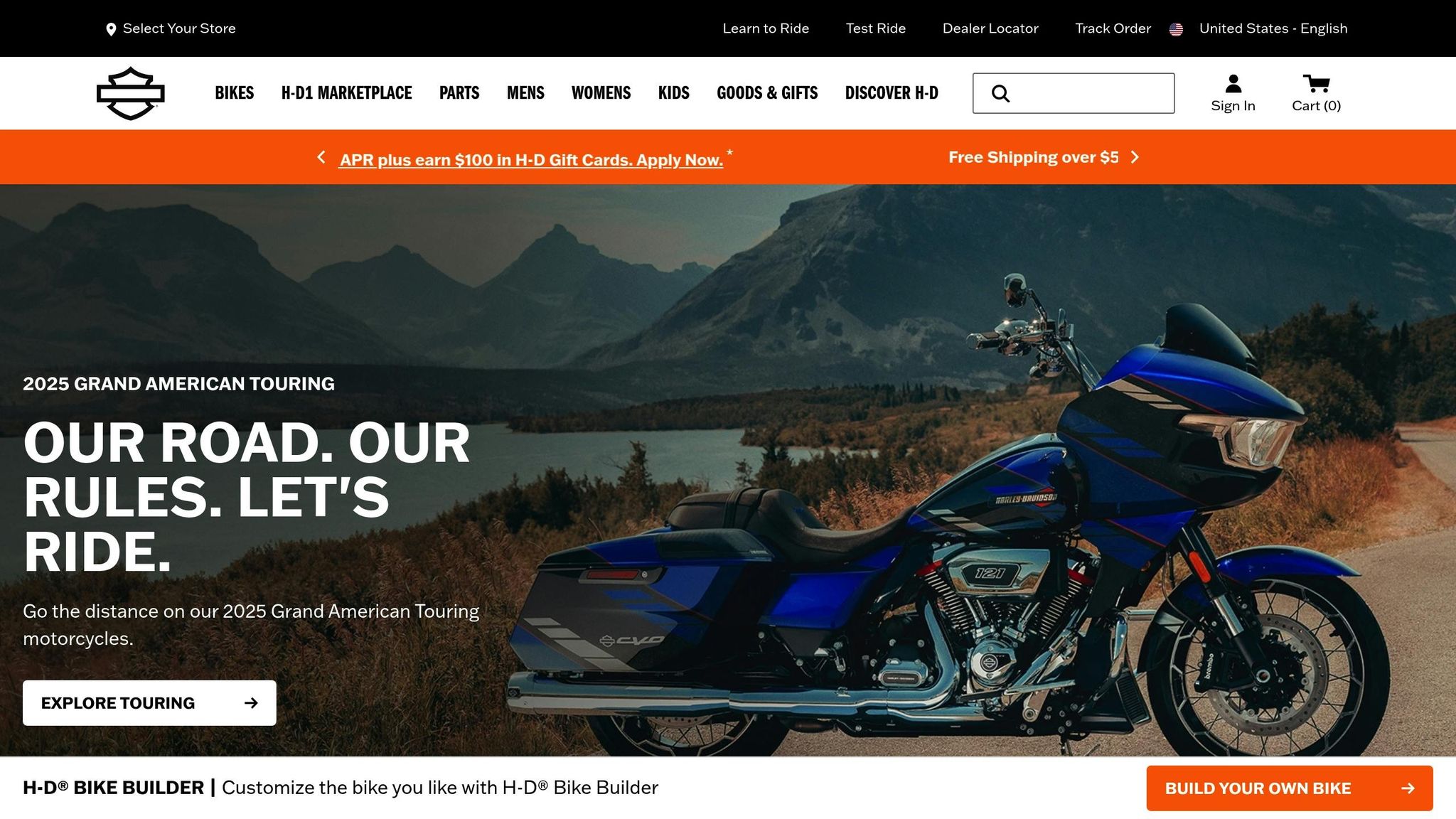
The Challenge
Asaf Jacobi's Harley-Davidson dealership in New York City faced significant hurdles in generating leads. The business was selling just one or two motorcycles per week - far below what was needed to support growth [3]. Adding to the challenge, the dealership struggled to pinpoint and connect with the right audience in a cost-effective way, all while trying to keep acquisition and retention expenses in check [4]. These obstacles called for a major shift in strategy, paving the way for an AI-powered solution.
The Solution
In 2016, Harley-Davidson of New York City teamed up with Adgorithms to use their AI-driven marketing platform, Albert. This partnership marked a turning point for the dealership. Albert tapped into customer data from the dealership's CRM system to identify patterns and traits of high-value clients. Using this data, the AI pinpointed "lookalikes" - potential customers with similar profiles - and created highly targeted micro-segments for marketing campaigns.
Albert didn't stop there. It managed resources across digital platforms in real time, fine-tuning content suggestions and optimizing ad strategies. For instance, the AI revealed that ads featuring the word "call" performed 447% better than those using "buy" [4].
"I put the bet that artificial intelligence will outperform anything that I would be able to hire."
– Asaf Jacobi, president of Harley-Davidson of New York City [5]
The Results
The results were nothing short of transformative. In just three months, the dealership saw a staggering 2,930% surge in qualified leads. Daily lead generation jumped from one to 40 qualified prospects [3]. During the first month, 15% of these leads were "lookalikes" resembling previous high-value customers. By the third month, that number had grown to 50%, meaning half of all new leads were highly likely to convert.
The impact was immediate. During a single weekend trial of Albert, the dealership sold 15 motorcycles - nearly doubling their previous summer weekend record of eight. The influx of inquiries was so overwhelming that they had to establish a new call center staffed with six employees to handle the demand.
"I've been working with Albert for a year and a half now. What surprised me from the start was how easy the implementation was and how fast it adjusted to our benchmarks. I would never have guessed it in a million years how big and fast the improvement would be. I wasn't prepared for such a rapid growth in such a short period of time."
– Asaf Jacobi, president of Harley-Davidson of New York City [5]
Beyond the immediate numbers, the dealership's business tripled compared to the previous year. This wasn't just a short-term boost; AI-driven lead scoring proved to be a sustainable growth strategy that redefined the dealership's trajectory.
Case Study 3: Druva – Improving Sales Operations
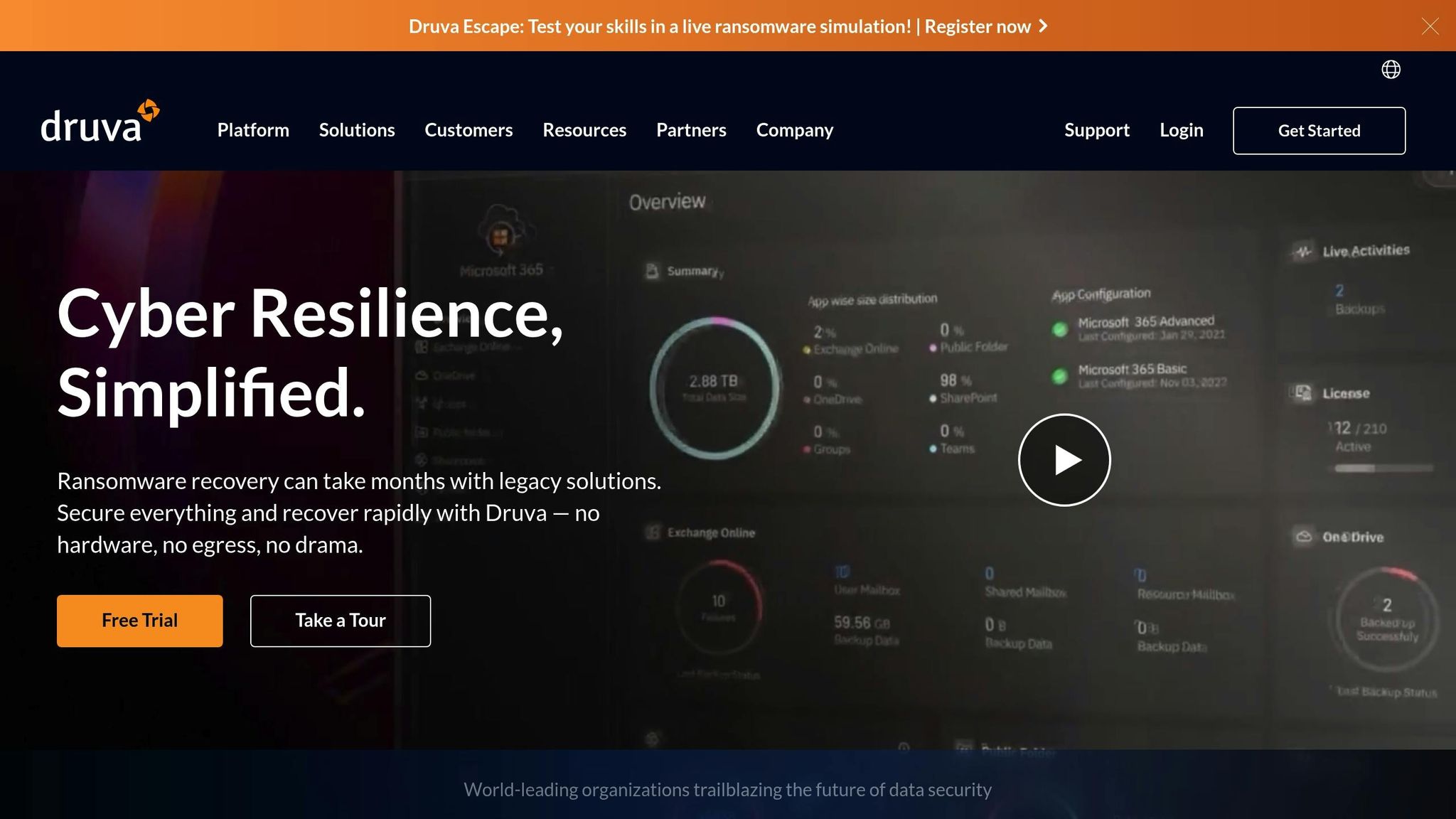
The Challenge
Druva faced a major hurdle: too much time and effort were being spent on leads that went nowhere. Their sales team was chasing prospects that rarely turned into paying customers, wasting resources in the process. For a company focused on delivering data protection solutions on a global scale, this inefficiency made it difficult to grow while keeping lead quality high [6].
The Solution
Druva turned to an AI-powered solution to address this problem. They implemented a system that assessed leads based on behavior, engagement, and firmographics [6]. By analyzing how prospects interacted with their marketing materials and identifying characteristics that indicated a strong potential fit, the system ranked leads by value. This allowed sales reps to concentrate on the most promising opportunities rather than sorting through massive amounts of data manually.
The Results
After rolling out the AI-driven lead scoring system, Druva saw a noticeable boost in both conversion rates and sales speed [6]. By directing their efforts toward high-quality leads flagged by the AI, the team not only improved conversions but also accelerated their sales process. This efficiency gain allowed them to expand operations without needing to increase their workforce.
Case Study 4: U.S. Bank – Better Financial Lead Conversion
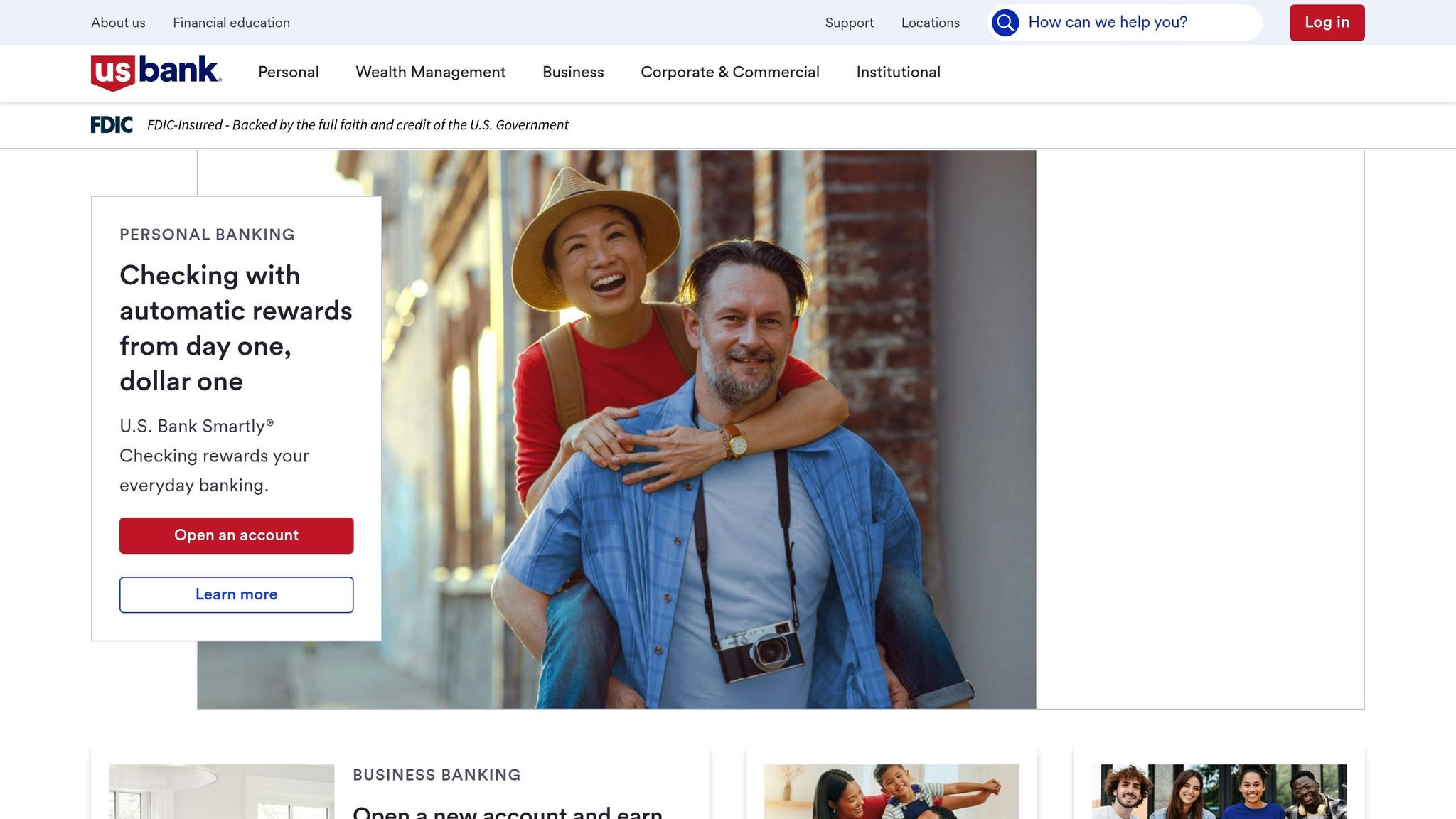
The Challenge
U.S. Bank's sales team faced an overwhelming challenge: managing thousands of incoming leads daily from multiple channels. Their existing CRM scoring system was too basic to handle this volume effectively. It produced a flood of false positives and negatives, leaving sales reps unsure about which leads to prioritize [7].
This inefficiency meant valuable time was wasted chasing low-quality prospects, while high-potential leads were often overlooked. For a financial institution managing services like personal banking and commercial lending, this scattered approach was a major roadblock, costing them opportunities to drive revenue. U.S. Bank needed a more precise and scalable solution to manage its lead flow [7].
The Solution
To address this, U.S. Bank implemented Salesforce Einstein, an AI-powered CRM tool designed to handle large-scale lead management with precision. Einstein's predictive lead scoring model was trained on the bank's historical data, learning to identify patterns that signaled which leads were most likely to convert [7].
This AI system evaluated a wide range of data points, including company size, job roles, web activity, and email engagement, to assign each lead a score. Leads were then segmented into clear categories like "Hot MQL", "Warm – needs nurturing", or "Low Priority." Each category triggered specific nurture campaigns, ensuring tailored follow-ups for every lead [7].
Einstein's standout feature was its speed: it could process 4.5 million leads in just two hours, a task that would have taken months if done manually [8]. Additionally, the system recalibrated scores every ten days, keeping up with shifting market dynamics [8].
Sales reps could easily access each lead's Einstein Score, along with insights into the factors influencing that score. Dashboards provided a deeper look, showing metrics like average lead scores by source, conversion rates by score, and overall lead score distribution [8].
The Results
The results were game-changing. U.S. Bank saw a 260% increase in lead conversion rates and a 300% growth in marketing-qualified leads after adopting Salesforce Einstein [7][10]. By focusing on high-probability prospects identified by the AI, the sales team closed 25% more deals compared to their previous strategy [7].
"We work to build high-quality, personalized relationships between our customers and their financial advisors or commercial bankers. There is nothing that replaces that person-to-person interaction. What AI allows us to do is augment that relationship. We can provide our teams with better data and smarter insights, which helps them establish stronger relationships." - Srini Nallasivan, Chief Analytics Officer, U.S. Bank [9]
The AI also uncovered valuable insights that traditional analysis might have missed. For instance, it revealed that mortgage owners were more likely to increase their assets under management if they also held a credit card - a cross-selling opportunity that could significantly enhance customer lifetime value [8].
Salesforce reported that U.S. Bank experienced a 2.35x lift in lead conversion, proving how AI-powered tools can revolutionize lead management, even for large-scale financial operations [8]. This case demonstrated that with the right AI solution, businesses can not only manage massive lead volumes but also improve the quality of their conversions.
sbb-itb-9cd970b
Using AI for Lead Scoring (AI for Business People Series)
AI Lead Scoring Results Comparison
These four case studies demonstrate how AI lead scoring can dramatically improve key metrics like lead quality, conversion rates, and sales cycle efficiency. The table below provides a side-by-side summary of these metrics, showcasing the advantages AI brings across different industries.
Comparison Table
| Company | Industry | Key Metrics Improved | Conversion Rate Impact | Lead Quality/Volume Growth | Sales Cycle Impact | Additional Benefits |
|---|---|---|---|---|---|---|
| Grammarly | SaaS/Writing Tools | User engagement, trial conversions | 30% increase in MQL conversion | 50% reduction in lead volume (400 to 200), higher quality | 50% reduction (60-90 days to 30 days) | 80% increase in upgrades, improved team collaboration |
| Harley-Davidson | Automotive/Motorcycles | Lead generation, dealer efficiency | Data not detailed | 2,930% surge in qualified leads (1 to 40 daily) | Data not detailed | Business tripled, new call center established |
| Druva | Enterprise Software | Sales operations, lead prioritization | Noticeable boost | Enhanced lead management efficiency | Accelerated sales process | Improved operational scaling |
| U.S. Bank | Financial Services | Lead conversion, MQL generation | 260% increase | 300% growth in MQLs | Data not detailed | 25% more deals closed, 2.35x conversion lift |
This table underscores the earlier findings, illustrating how AI lead scoring consistently delivers measurable improvements, even when industries face unique challenges.
Beyond these case studies, broader research highlights the potential of AI in sales processes. On average, companies using AI lead scoring report 25% higher conversion rates, 51-52% better lead-to-deal ratios, and 30% shorter sales cycles [11][13][12]. Furthermore, approximately 75% of businesses experience noticeable performance gains within just six months of implementation [11]. These figures emphasize how AI's precision in identifying and prioritizing leads translates into substantial, tangible results.
Conclusion: What These AI Lead Scoring Success Stories Show
Across industries like SaaS and finance, these case studies highlight real gains in both conversion rates and operational efficiency. AI lead scoring has quickly become a cornerstone for businesses aiming to stay competitive in their sales strategies.
But the advantages go beyond just numbers. By integrating AI systems, teams have seen improvements in collaboration. For example, one B2B company reported a 45% boost in conversions, while 61% of marketers noted better coordination between sales and marketing teams [14][15].
Considering that 67% of lost sales stem from poor lead qualification [18], AI offers a game-changing ability to identify high-value prospects instantly. This allows teams to follow up more effectively - up to seven times more efficiently [16].
Unlike traditional methods, AI adapts continuously, learning from every interaction to stay aligned with shifting market demands. This adaptability is why 81% of sales teams are either testing or actively using AI, and Gartner projects that 65% will adopt data-driven sales processes by 2026 [17].
To keep up, businesses should evaluate their current lead scoring practices, implement AI-powered platforms, and ensure their teams are trained to use these tools effectively [18]. The companies featured in these case studies didn’t just add new software - they reimagined how they manage leads, creating streamlined, data-driven sales processes that deliver consistent results. These examples underscore how AI lead scoring can reshape sales operations for the better.
FAQs
How does AI lead scoring make sales teams more effective compared to traditional methods?
AI lead scoring transforms how sales teams operate by streamlining the process of identifying promising leads. Traditional methods often depend on manual work and subjective opinions, which can be inconsistent. In contrast, AI leverages data to rank prospects based on their likelihood to convert, helping teams focus on leads that matter most while cutting down on wasted time.
By reducing human errors and delivering real-time insights, AI lead scoring enhances decision-making and boosts conversion rates. Companies adopting this approach have reported noticeable improvements, including higher lead qualification rates and revenue growth. These results highlight how AI-driven methods consistently surpass traditional ones in both precision and efficiency.
How has AI lead scoring helped businesses across different industries improve sales performance?
AI lead scoring has reshaped how businesses approach sales by pinpointing high-potential leads with greater precision and speed. Take the real estate sector, for instance - AI has enabled companies to focus on leads most likely to close, drastically cutting down the time wasted on prospects that won't convert. Meanwhile, e-commerce businesses have tapped into AI lead scoring to deliver personalized offers, boosting both conversion rates and revenue.
In the B2B SaaS world, AI tools have proven invaluable by helping sales teams zero in on accounts primed for renewals or upsell opportunities. This not only strengthens customer retention but also fuels growth. These examples underscore the power of AI lead scoring to simplify sales workflows and drive real, measurable outcomes across various industries.
What factors should businesses consider to successfully implement AI lead scoring tools?
To make AI lead scoring tools work effectively, businesses need to ensure they integrate smoothly with their current CRM and marketing systems. This ensures accurate data flow and proper processing. The quality of the data is key - AI performs best when it has access to well-organized and reliable inputs. Regularly reviewing and adjusting the AI model is also essential to keep it accurate, relevant, and in line with expectations over time.
Companies should also tackle any technical hurdles, like ensuring the systems are compatible and being transparent about how the AI makes decisions. By addressing these factors, businesses can get the most out of AI lead scoring and improve their sales results.


